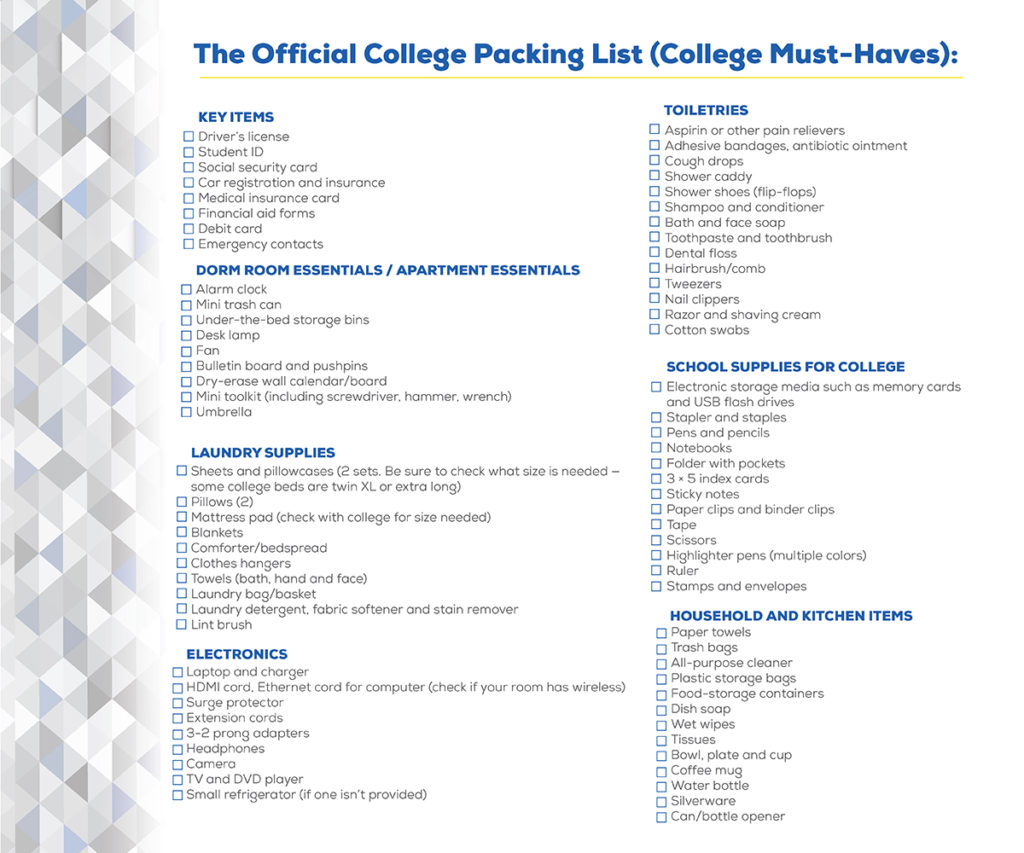Congratulations, you’re officially a college freshman! This is both an exciting and frightening transition for most students. There are many things to do in the summer before college, and it can be difficult to know how to get ready. There are things to pack, people to say goodbye to, and forms to fill out.
For those already stressing over this new life chapter, there are plenty of ways to prepare before even stepping foot in a classroom or dorm. We’ve compiled a list of all of the important must-do items, so if you work through it a little at a time – you’ll be done before you know it!
Before you arrive on campus, use the following checklist to make sure you stay on track:
1. Make a Commitment
Once you’ve made your decision about which college to attend, you’ll need to commit to that college. You may be able to do this online or you may have to do it in writing.
You’ll need to send in your deposit, complete and accept the financial aid application, and fill out any health forms that are required the summer before college. Be sure to read the information closely and promptly respond to all of the forms you receive from your college so as to not miss any deadlines.
Read through your acceptance letter completely and take note of important dates. Dates to keep in mind may include:
- Deadline to accept admission (and pay the acceptance fee, if applicable)
- Deadline to submit final high school transcript
- Deadline to take placement tests
- Deadline to apply for housing
- Deadline to file your financial aid documents
- Deadline to sign up for orientation
2. Establish Housing
Since many colleges require incoming freshmen to live in dorms, chances are high you’re going to have a roommate. Whether you are living on campus in a dorm or off campus in an apartment or house, make sure you have your housing lined up as early as possible. If you’re staying on campus, see if you can request housing that is close to your classes so you can save time each day.
If your college has assigned a roommate, reach out by phone, connect through social media, get to know each other, and coordinate on furnishing and decorating your dorm.
If you are looking for off-campus housing, make sure you check out several locations that meet your budget and your needs. Also, be sure to read your lease in its entirety, so you know what your landlord expects.
3. Schedule a Campus Tour
You can walk around the campus on your own, but scheduling a guided tour will give you more insight into the different areas of campus and what you can expect on your first day. While you’re exploring campus, make sure you note where the emergency points and security office are located. Both parents and students should take time before the semester begins to become familiar with the campus’ safety resources and procedures.
If you’re attending a college out of state, use this time to explore your new location. Now’s the time to research the popular restaurants, the nearest theaters and music venues, the parks in your proximity; to research the history, culture, and local population; and to identify some of the neighborhoods, landmarks, attractions, and adjacent towns worth seeing.
4. Register for Orientation
Orientation for incoming students may be mandatory at your college, but if it isn’t – try your best to attend anyway. This is especially important if you haven’t been able to visit the college beforehand. Register for an early orientation to (hopefully) get the classes you want, as well as to familiarize yourself with the campus and to see your official dorm and cafeteria options firsthand.
Orientation is a crucial time to start making friends, research clubs and organizations, and get to know your campus environment. Don’t miss out on this opportunity to ask questions and get involved. It’s important to note that everyone is going through the same thing, so don’t be shy – try to make as many connections as you can.
5. Practice Life Skills
Your parents are most likely not heading off to college with you. This means you are responsible for your cooking, cleaning, and laundry – maybe for the first time in your life. Now is a great time to practice. Take the opportunity to learn how to cook some quick and simple meals, wash and dry your clothing properly, and clean up after yourself.
Make sure you have established a checking and savings account that you can access to pay bills or withdraw cash as needed. These essential skills will keep your life outside the classroom on track.
6. Visit Your Doctor
Get up to date on all your vaccinations; most colleges require that you submit updated vaccination information before or during your first year.
If you have a regular or essential prescription, work with your doctor to have it transferred before you leave to a pharmacy near your campus, or get a second prescription written. In general, this is a chance to get a clean bill of health, update prescriptions, and ask your doctor any pressing questions before you leave home.
7. Start Networking
If you haven’t done this already, now would be a good time to engage with your college online. It’s a great way to participate in ongoing discussions and also familiarize yourself with the culture and lingo of the college.
One of the best ways to connect with other prospective or accepted freshmen at your university is through social media. Try searching your university with your prospective class year and see if any groups exist. Add your future school onto your profile on Facebook and LinkedIn to help encourage the connections even further.
Use this time to clean up your social media and make sure everything you post online represents your best self.
- Double check that comments made by you and your friends are positive and professional
- Make sure all photos (not just your profile image and cover images) are appropriate
- Set your privacy settings accordingly
Look for ways to get involved on campus, whether you want to join a club or team (or both). Spend some time researching the clubs and organizations related to your major, or check out some of the varsity, intramural or club sports your school hosts. Get an idea of what’s available before you get to campus so you don’t waste any time once you’re there.
8. Pack, Pack, Pack!
The best way to feel prepared for your new adventure is knowing you’re fully prepared. Explore our college packing list for dorm room and apartment essentials.
Before you buy or pack anything, be sure to check with your school about what items are and are not allowed. Most schools have to be very careful about health and safety regulations, and rules differ from place to place. Check out our Official College Packing List (College Must-Haves), which includes dorm room essentials (or apartment essentials), school supplies for college, and other key items for move-in day.
College move-in day can be extremely thrilling and a little scary. Even though moving into the dorms, finding your classes, and adjusting to your new surroundings can be overwhelming, remember to enjoy the experience. You’ll be making friends, discovering new hobbies, and learning more about yourself than ever before in no time!
Be sure to connect with us @ecampusdotcom on Twitter, Instagram, & Facebook for more resources, tips, and some great giveaways! And when it’s time for textbooks, eCampus.com has you covered for all your course material needs at savings up to 90%!
References:
- https://blog.collegeboard.org/summer-before-college-checklist
- https://studentaid.gov/resources/prepare-for-college/checklists/12th-grade
- https://bigfuture.collegeboard.org/get-in/making-a-decision/off-to-college-checklist
- https://thebestschools.org/magazine/summer-before-college/
- https://www.nitrocollege.com/blog/4-checklists-for-college



